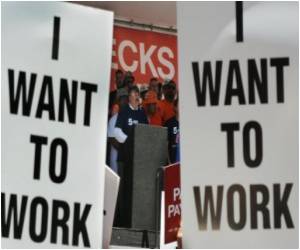The immigrant-heavy Stockholm suburb where riots have raged for five straight nights, behind the well-kept lawns and flowerbeds of Husby, unemployment is fuelling despair among the young residents.

Husby's brightly coloured concrete apartment blocks look much like they did when they were built in the mid-seventies, albeit a tad more grimy and with satellite dishes now dotting the facades.
There are other clues times have changed since the first tenants moved in almost 40 years ago: window grilles and safety gates have come up, here and there graffiti have yet to be washed away by the area's many maintenance workers.
In one of the world's most expensive cities, local hairdresser Salon Abdu charges just 60 kronor (seven euros, nine dollars) for a men's haircut.
"I only work here sometimes in the morning," says Saron Haile at Symba Afro Caribbean Cosmetics. After three years in Sweden, she prefers to speak English.
At the "Jambo clothes store" a few shops away, the two Somali women behind the counter speak neither Swedish nor English.
Advertisement
Although the social democratic government did succeed in creating more affordable housing by the mid-seventies, little else went to plan.
Advertisement
Middle-class Swedes moved out, and when the country in the past decade welcomed hundreds of thousands of asylum seekers from Iraq, Afghanistan, and Somalia, among others, the apartments they were allocated were often in areas like Husby.
Housing segregation is often named as one of the reasons it takes the average immigrant to Sweden years, not months, to find work. Even among the second generation, many say they rarely make it to a job interview.
"We want jobs," said Jamil, a 22-year-old resident of Iraqi origin working as a gardener.
Sweden's government has earned praise for its handling of the economy, but the country is plagued by one of the highest youth unemployment rates in Europe.
Even cleaning jobs are hard to get, Jamil noted. He added that being found in possession of marijuana is deemed a "minor drug offence" and severely reduces chances in the job market.
"It is very common here in Husby and that stays with you for 10 years, even though they say it's minor," he said.
The rioters "felt they had to take these actions to get the press here, to get the big police bosses here, to turn the situation around. Suddenly, the past three days have been really interesting. Husby is on the world map," he said.
Daniel, 24-year-old social worker from Husby, said finding a job after graduating from high school turned out to be harder then he thought, and that the suburb's bad reputation may have been an impediment for him.
"Unfortunately I've only gotten jobs when I said I lived in (nearby and less notorious suburbs) Akalla and Kista. I don't know if it's got anything to do with that but it's a funny coincidence," he said.
"There is a lot of anger towards the police and there's a lot of anger towards the politicians. A lot of things are in the air," he said.
Ileana Lukacs, who came to Sweden from Romania 40 years ago, also blamed the area's troubles on unemployment.
Although she was only staying temporarily in Husby, many of the problems were the same in Kista.
"I have a 23-year-old who's been applying for jobs. He's gone to university, and he's very ambitious, but he still hasn't gotten any work," said Lukacs.
Since her arrival four decades ago, Sweden had in some ways changed for the worse.
"Finding a job was extremely easy in the eighties. I once went to the job centre in the morning and had work in the afternoon," she said.
"I've never been without a job. This is a nightmare scenario for my children."
Source-AFP









